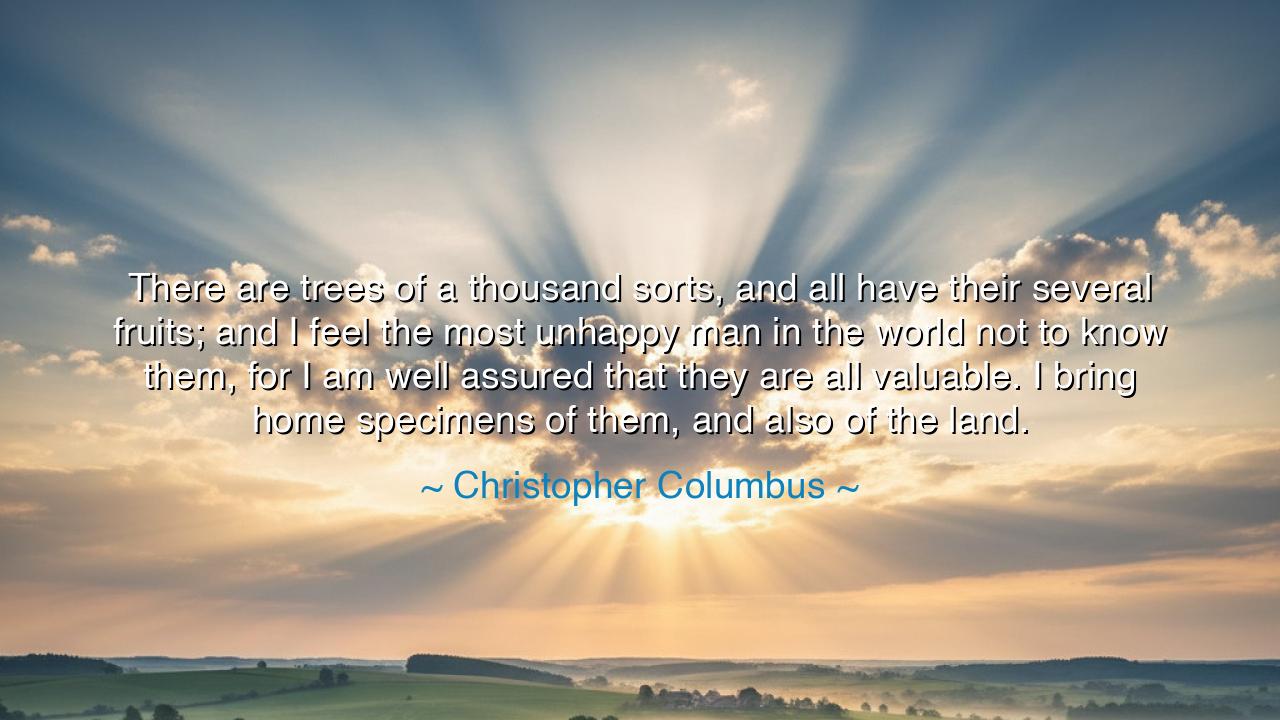
There are trees of a thousand sorts, and all have their several
There are trees of a thousand sorts, and all have their several fruits; and I feel the most unhappy man in the world not to know them, for I am well assured that they are all valuable. I bring home specimens of them, and also of the land.






When Christopher Columbus spoke the words, “There are trees of a thousand sorts, and all have their several fruits; and I feel the most unhappy man in the world not to know them, for I am well assured that they are all valuable. I bring home specimens of them, and also of the land,” he uttered more than a traveler’s lament — he gave voice to the eternal yearning of the human spirit: the hunger to understand the unknown. Beneath his awe for the trees and fruits of the New World lies the cry of every seeker, every wanderer who looks upon creation and realizes the limits of his knowledge. The explorer’s unhappiness is not despair, but reverence — the sorrow of one who beholds vast beauty yet cannot grasp it all.
In that sentence, the trees become symbols of life’s infinite diversity, of the countless wonders scattered through the world and within the human soul. Columbus stood at the edge of a new continent, seeing before him a garden untended by his understanding. The fruits were not only physical — they were mysteries, languages, cultures, creatures, and possibilities unknown to him. His unhappiness was the burden of the visionary, for those who see far suffer most deeply the pain of knowing how little they truly comprehend. The ignorant sleep peacefully; the awakened mind wrestles with wonder.
So too did Alexander the Great, when, standing before the ocean he could not cross, wept because there were “no more worlds to conquer.” His tears, like Columbus’s sorrow, sprang not from greed but from yearning — the boundless drive within humankind to discover, to learn, to name, to grow. The explorer’s curse is that discovery reveals more mystery; the scholar’s torment is that knowledge opens more questions. Thus, both the conqueror and the navigator share one fate: to chase horizons that recede forever before them.
Yet there is deep nobility in such unrest. The unhappy man who longs to know is greater than the contented man who refuses to look beyond his gate. Columbus’s words remind us that to live fully is to be in constant pursuit — not of wealth or conquest, but of understanding. To bring home “specimens of them, and also of the land” is the duty of every curious soul: to gather fragments of the world’s wisdom and carry them back for the benefit of others. He was not content merely to see; he sought to share, to record, to learn. His was the sacred labor of the explorer — to act as bridge between the known and the unknown.
But we must also hear the deeper warning beneath his lament. To gaze upon wonders and not know them is to live half-awake. In every age, the world is filled with trees of a thousand sorts — new ideas, people, arts, and truths waiting to be discovered. Yet many pass them by, blind to their value. We live surrounded by unseen marvels: the thoughts of others, the wisdom of ancient texts, the quiet beauty of a dawn sky. Columbus’s sorrow should stir us to look closer — to live not as travelers through the world, but as students of it.
Consider, too, that the value of discovery lies not only in what we find, but in what it makes of us. The act of seeking refines the soul. To explore without arrogance, to wonder without greed, to observe with humility — these are the virtues of the true adventurer. Columbus may not have understood the lands he found, nor the people who dwelled there, but his awe — his confession of ignorance — is the mark of wisdom. The wise man is not he who knows much, but he who knows how little he knows.
Therefore, let this teaching be passed on: never cease to seek, and never be ashamed of not knowing. The moment you think yourself full of knowledge, your spirit begins to die. Be as Columbus in his sorrow — humble before creation, ever gathering “specimens” of truth wherever they grow. Let your mind be a garden of learning, your heart a vessel for wonder. And when you return from your journeys — whether through books, through lands, or through the corridors of your own soul — bring home not gold, but understanding. For the world is vast, and though no man may know all its fruits, blessed is he who never stops trying.






AAdministratorAdministrator
Welcome, honored guests. Please leave a comment, we will respond soon